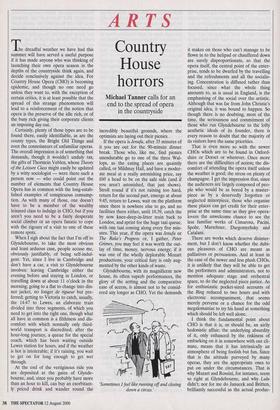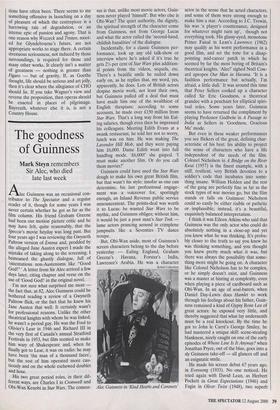ARTS
Country House horrors
Michael Tanner calls for an end to the spread of opera in the countryside
he dreadful weather we have had this summer will have served a useful purpose if it has made anyone who was thinking of launching their own opera season in the depths of the countryside think again, and decide conclusively against the idea. For Country House Opera (CHO) is becoming epidemic, and though no one need go unless they want to, with the exception of certain critics, it is at least possible that the spread of this strange phenomenon will lead to a reinforcement of the notion that opera is the preserve of the idle rich, or of the busy rich giving their corporate clients an imposing day out.
Certainly, plenty of those types are to be found there, easily identifiable, as are the county types, the Bright Old Things and even the connoisseurs of unfamiliar operas. The overall impression is of something that demands, though it wouldn't unduly tax, the gifts of Thorstein Vet)Ien, whose Theory of the Leisure Class might easily be updated by a witty sociologist — were there such a person now — who could point out the number of elements that Country House Opera has in common with the long-estab- lished examples of conspicuous consump- tion. As with many of those, one doesn't have to be a member of the wealthy leisured class to indulge in CHO, but if you aren't you need to be a fairly desperate social climber or an opera fanatic to cope with the rigours of a visit to one of these remote spots.
When I sigh about the fact that I'm off to Glyndebourne, to take the most obvious and least arduous case, people accuse me, obviously justifiably, of being self-indul- gent. Yet, since I live in Cambridge and don't have a car, a visit to Glyndebourne involves: leaving Cambridge either the evening before and staying in London, or travelling down at about 11 o'clock in the morning; going to a flat to change into din- ner jacket, no longer de rigueur but pre- ferred; getting to Victoria to catch, usually, the 14:47 to Lewes, an elaborate train divided into three segments, of which you need to get into the right one, though what all have in common is a filthiness and dis- comfort with which normally only third- world transport is discredited; after the hour-long journey, a queue for the special coach, which has been waiting outside Lewes station for hours, and if the weather is hot is intolerable; if it's raining, you wait to get on for long enough to get wet through.
At the end of the vertiginous ride you are deposited at the gates of Glynde- bourne, and, since you probably have more than an hour to kill, can buy an exorbitant- ly priced drink and wander round the incredibly beautiful grounds, where the optimists are laying out their picnics.
If the opera is Jenufa, after 35 minutes of it you are out for the 90-minute dinner break. Those who, like me, find picnics unendurable go to one of the three Wal- lops, as the eating places are quaintly called, or Mildmay Hall, and have a moder- ate meal at a really astonishing price, say £60 a head to be on the safe side (and if you aren't astonished, that just shows). Stroll round if it's not raining too hard, return for the second part, emerge at about 9.45, return to Lewes, wait on the platform since there is nowhere else to go, and no facilities there either, until 10.39, catch the by now knee-deep-in-litter train back to London, and sprint for the huge taxi queue, with one taxi coming along every five min- utes. This year, if the opera was Jenufa or The Rake's Progress or, I gather, Peter Grimes, you may feel it was worth the out- lay of time, money, nervous energy; if it was one of the wholly deplorable Mozart productions, your critical fury is only aug- mented by the other kinds of waste.
Glyndebourne, with its magnificent new house, its often superb performances, the glory of the setting and the comparative ease of access, is almost not to be consid- ered any longer as CHO. Yet the demands 'Sometimes I feel like running off and closing down a circus.' it makes on those who can't manage to be flown in to the helipad or chauffered down are surely disproportionate, so that the opera itself, the central point of the enter- prise, tends to be dwarfed by the travelling and the refreshments and all the socialis- ing. Concentration is diffused rather than focused, since what the whole thing amounts to, as is usual in England, is the emphasising of the social over the artistic. Although that was far from John Christie's original idea, it was bound to happen. So though there is no doubting, most of the time, the seriousness and commitment of those who run Glyndebourne to the lofty aesthetic ideals of its founder, there is every reason to doubt that the majority of its visitors have the same priorities.
That is even more so with the newer CHOs which are to be found in Oxford- shire or Dorset or wherever. Once more there are the difficulties of access; the dis- comfort of attending the opera itself unless the weather is good; the stress on plenty of champagne. I get the impression that, since the audiences are largely composed of peo- ple who would be as bored by a master- piece as by a deservedly forgotten or neglected minorpiece, those who organise these places can get credit for their enter- prise at the same time as they give opera- lovers the unwelcome chance to see the less familiar works of Cimarosa, Pacini, Spohr, Marschner, Dargomyzhsky and Catalani.
There are works which deserve disinter- ment, but I don't know whether the dubi- ous pleasures of CHO are meant as palliatives or persuasions. And at least in the case of the newer and less plush CH0s, it is unlikely that they will be able to get the performers and administrators, not to mention adequate- stage and orchestral space, to do the neglected piece justice. As for enthusiastic pocket-sized accounts of the Ring reduced to two hours and with electronic accompaniment, that seems merely perverse or a chance for the odd megalomaniac to try his hand at something which should be left well alone.
I think the fundamental point about CHO is that it is, or should be, an airily hedonistic affair: the underlying absurdity of it, only enhanced by the riskiness of embarking on it in somewhere with our cli- mate, means that it has intrinsically an atmosphere of being foolish but fun. Since that is the attitude purveyed by many operas, they are the appropriate ones to put on under the circumstances. That is why Mozart and Rossini, for instance, seem so right at Glyndebourne, and why Lulu didn't; nor for me do Janucek and Britten, brilliantly successful as the actual produc- tions have often been. There seems to me something offensive in launching on a day of pleasure of which the centrepiece is a harrowing tale of degradation, or an intense epic of passion and agony. That is one reason why Wozzeck and Tristan, moot- ed for Glyndebourne's future, are not appropriate works to stage there. A certain strenuous seriousness, not induced by those surroundings, is required for those and many other works. It clearly isn't a matter of greatness — nothing is greater than Figaro — but of gravity. If, as Goethe thought, life should be serious and art jolly, then it's clear where the allegiance of CHO should lie. If you take Wagner's view and reverse the proposition, then operas should be enacted in places of pilgrimage. Bayreuth, whatever else it is, is not a Country House.



























































 Previous page
Previous page